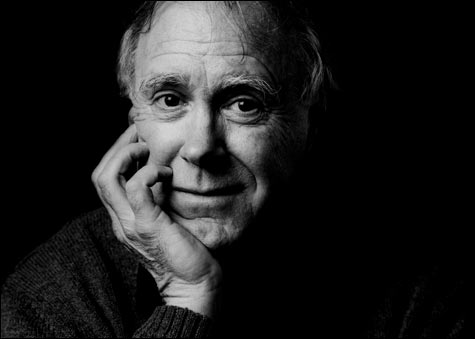
MILOSZ MAN: Hass is a master of the “long breath,” lines musical and packed yet leisurely. |
| Time And Material: Poems 1997–2005 | By Robert Hass | Ecco | 96 pages | $22.95 |
Notwithstanding the occasional university-press finalist (this year: David Kirby), the National Book Award for poetry is generally open to only a few American poets — those published by major presses like Ecco (HarperCollins), Knopf, and Farrar, Straus and Giroux. Poets published by small presses rarely get nominated and never win. This year’s winner, Robert Hass, is published by Ecco, and he is a fine poet despite the handicap of having an unfair advantage when it comes to prizes. If you do not know his poetry (it’s new to me), the prize-winning Time and Materials, his first book in nine years, is a good place to start.Time and Materials opens with a two-line poem, as if Hass were getting started after a layoff. That’s followed by nine shortish poems that, though nicely made, feel like warm-ups. Then “Winged and Acid Dark” with the lines that I take to be one of the book’s moral hubs:
Bashô told Rensetsu to avoid sensational materials.
If the horror of the world were the truth of the world,
he said, there would be no one to say it
and no one to say it to.
The ease of statement turns out to be typical of Hass, and so is the somewhat distant regard from which he sees things. But he is also a poet of great intimacy, and his distance is the “Oh!” that he defines for his friend Czeslaw Milosz as “a long breath of wonder.”
Hass is a master of that long breath, and his lines are as supple and sure, as musical and packed yet leisurely, as those of any American poet I know writing today. That’s evident in this volume’s “The World As Will and Representation” and at least 10 other poems equal to it. Hass’s long lines create the free flow and amplitude of stories while accommodating much beautiful natural description — beautiful in visual and aural accuracy.
The key to his poetry may be in a passage from his essay “Reading Milosz” in which he remembers a summer reading the Moderns (Eliot, Pound, et al.) in his Northern California home. “The setting was bucolic, orchards, dairy cattle grazing the hills, olive trees whitening in what wind there was. I noticed the contrast, but did not know that it could form the basis for a life’s work in poetry. Milosz arrived in California at just about that time.” Hass became one of Milosz’s American translators — translations of a Milosz sequence as well as the poem to him are in this book — and he has forged a unity in his poetry between the world outside his window and “the horror of the world” the Moderns saw so clearly.
I was not held by every poem here. Hass is the sort of poet — I may change my mind about this — whose weaker poems give the reader a rest and are easily forgotten. In this book he is at his best in his longer poems, but I was struck hard by his three “imitations” of Horace and throughout responded to his sense of humor, which is dry with an after-laugh of the pleasure he takes in enjoying himself.
One poem that particularly amused me is “The Palmer Method,” Hass’s homage to his contemporary and fellow Californian Michael Palmer. Hass responds to Palmer’s elegance and, to a quality too often overlooked by Palmer’s critics, his playing with words and his delight in turning a cliché on its ear. It’s a rare sort of tribute, just right in a book of many pleasures.